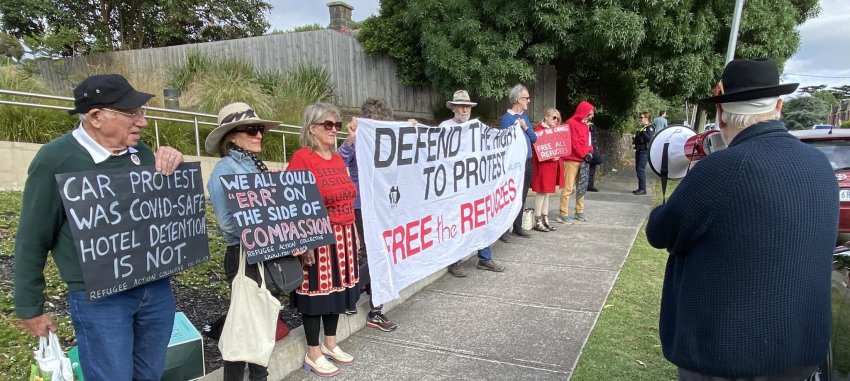
Police have dropped charges against eight refugee supporters who participated in a car cavalcade on April 10, 2020.
The eight were among about 30 people who participated in the car convoy past the Mantra Hotel in Preston. At that time the hotel was being used as a prison to detain refugees who had been brought to Australia for medical treatment after being detained for many years on Manus Island or Nauru.
The refugees in the Mantra were suffering from both medical and psychological problems, largely caused by prolonged detention and medical neglect.
They were also fearful of catching COVID-19 from the guards, who were in close proximity at a time when medical advice emphasised the need to keep a distance.
The car convoy, organised by the Refugee Action Collective, was intended to boost the psychological wellbeing of the refugees, by showing that people cared about them.
It was also meant to draw public attention to the COVID-19 risk in the hotel-prison.
Police stopped the cars and issued infringement notices to 30 people for supposedly violating the COVID-19 restrictions at that time. Each person faced a penalty of $1652.
Some paid the fine, but others challenged it in court, arguing the cavalcade was not illegal.
At that time in Victoria people were allowed to leave home for four reasons, one of which was to show “care and compassion” for those in need.
We argued the car convoy fitted this category, because we were giving refugees much-needed psychological support, while drawing attention to the risks they faced.
We pointed out that convoy participants remained in their cars so they could not have spread the pandemic.
As the court process dragged on for more than three years, some defendants agreed to be put on a diversion order, which meant pleading guilty but without having to pay a fine.
Eight of us continued with the case. We went to court once again on November 22. The magistrate set dates for further hearings in May and June 2024. However, our lawyers argued that continuing the case would be an abuse of process.
The following day the prosecution dropped the case — a victory for the refugee rights movement.
However, the situation for many refugees remains dire. Those in the Mantra hotel-prison were allowed out a few at a time over the next year or two.
But they were given short-term visas that create a feeling of insecurity and make it difficult for them to plan their lives. The campaign for permanent visas continues.